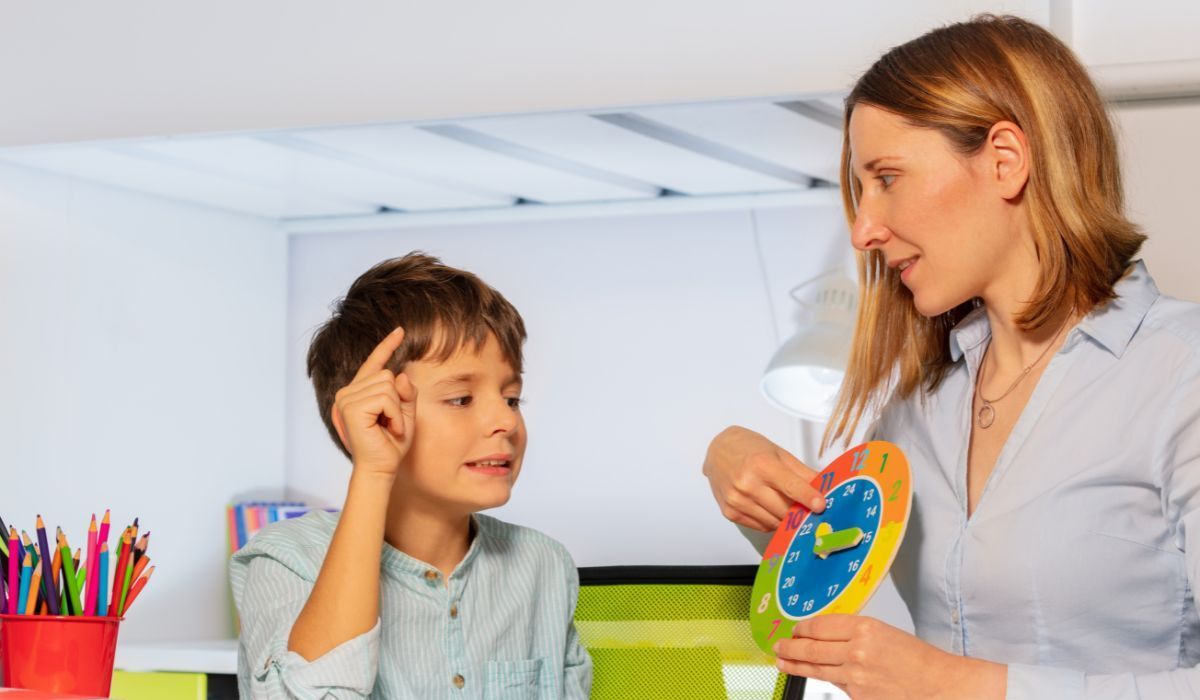What to Do When Your Child Can’t Express Their Needs
Reece Epstein • July 11, 2025
Easy tips to help your child communicate their needs, even without words.

As a parent or caregiver, few things are more heartbreaking than watching your child struggle to communicate. Communication is fundamental—it’s how we connect, learn, express feelings, and meet our needs. When a child cannot effectively express their needs, whether through words, gestures, or other means, it often leads to frustration, misunderstanding, and behavioral challenges.
At Able Minds ABA, we understand the unique challenges faced by families in this situation. We provide compassionate, evidence-based support to empower children to communicate in meaningful ways. Many families searching for ABA in home therapy near me or exploring options among ABA providers Maryland come to us looking for effective, personalized solutions.
In this article, we'll explore the reasons a child might struggle to express themselves, why addressing this early is crucial, how specialized therapy supports communication development, and what practical steps you can take to help your child thrive. If you’re searching for trusted ABA providers Maryland, this guide is designed from our perspective to offer insight, hope, and action.
Understanding Why Your Child May Struggle to Express Their Needs
Each child develops communication skills at their own pace. However, some children face significant barriers that make expressing needs difficult. Common challenges include:
- Delayed speech development: Your child may have limited or no verbal speech, making it hard to share needs using words.
- Difficulty with understanding language: Even if your child attempts to communicate, they may struggle to comprehend instructions or questions.
- Limited use of gestures or nonverbal cues: Some children may not instinctively use pointing, eye contact, or facial expressions to communicate.
- Behavior as communication: When words or gestures aren’t available, children may use behaviors like crying, tantrums, or withdrawal to signal their needs or feelings.
Recognizing these signs early is important. Children who cannot express needs effectively are at risk of experiencing frustration that can lead to increased behavioral challenges or social isolation.
Why Communication Skills Are Essential
Communication is the bridge that connects your child to the world. When a child learns to express needs, wants, and feelings, they experience:
- Reduced frustration and anxiety: Being understood lowers stress and decreases challenging behaviors.
- Stronger social connections: Communication is key to forming friendships and participating in group activities.
- Greater independence: Expressing needs helps children navigate daily life and ask for help when necessary.
- Improved learning opportunities: Communication supports understanding and engagement in educational settings.
Supporting communication development is not only about speech—it’s about giving your child tools to connect meaningfully with family, friends, and their environment.
How Specialized Therapy Helps Unlock Communication
Many families seeking ABA providers Maryland choose specialized therapy designed to improve communication and related skills. One of the most effective approaches is based on Applied Behavior Analysis (ABA), which focuses on teaching skills through positive reinforcement and individualized support.
What Does ABA Therapy Involve?
- Comprehensive assessment: Therapists evaluate your child’s current communication abilities and challenges to design a tailored program.
- Skill-building in functional communication: Therapy focuses on practical ways to express needs, from simple gestures to speech or alternative communication devices.
- Use of rewards and motivation: Positive reinforcement encourages children to use new communication methods by pairing them with meaningful rewards.
- Family involvement: Parents and caregivers receive training to reinforce communication strategies in everyday life, creating consistency and maximizing progress.
This approach recognizes the unique needs of each child and adapts strategies to their preferences and abilities.
Benefits of In-Home Therapy Services
For families searching for ABA in home therapy nearby, receiving therapy at home offers distinct advantages:
- Comfortable environment: Children feel safe and familiar in their own home, which reduces anxiety and supports learning.
- Real-life practice: Skills learned are immediately applicable in daily routines like mealtime, playtime, and getting dressed.
- Flexible scheduling: Therapy can be arranged around your family’s timetable, reducing logistical stress
- Enhanced family participation: Parents and siblings can more easily be involved in sessions, supporting generalization of skills.
At Able Minds ABA, we prioritize making therapy accessible and effective through in-home services tailored to your family’s needs.
Practical Strategies You Can Use At Home to Encourage Communication
Beyond professional therapy, your everyday interactions are powerful opportunities to support your child’s communication growth. Here are strategies you can implement at home:
1. Tune Into Your Child’s Cues
Watch carefully for any attempts your child makes to communicate, whether through sounds, gestures, facial expressions, or behavior. Respond positively to these cues to encourage more attempts.
2. Simplify Your Language
Use short, clear phrases paired with gestures or visual supports. This makes it easier for your child to understand and imitate communication.
3. Create Opportunities for Choice
Offer limited choices throughout the day to encourage your child to express preferences, such as “Do you want apple or banana?” Use pictures or objects to make choices tangible.
4. Model Communication
Narrate your actions and use simple language during activities. For example, say “Let’s put on your shoes” while demonstrating. This provides a natural example for your child to follow.
5. Use Visual Aids
Picture schedules, communication boards, or apps can help your child indicate needs and follow routines.
6. Celebrate Attempts and Successes
Provide enthusiastic praise and rewards when your child attempts communication, reinforcing their efforts and building confidence.
Understanding Behavior as Communication
When your child cannot verbally express needs, challenging behaviors often emerge as alternative communication methods. Recognizing this is a critical step.
Therapists trained in behavior analysis work to identify the function of behaviors—whether to gain attention, avoid demands, or express discomfort—and teach functional communication alternatives. This reduces frustration and improves the child’s ability to get their needs met in socially appropriate ways.
How Able Minds ABA Help: ABA Therapy and Family Support
At Able Minds ABA, we provide a full range of specialized services designed to support your child’s unique development and empower your family. Our approach combines personalized therapy with family training and comprehensive support to ensure meaningful, lasting progress. Explore how our dedicated team works with you every step of the way to unlock your child’s potential.
In-Home ABA Therapy
We provide personalized therapy sessions right in your home, creating a comfortable and familiar learning environment for your child. This approach helps children feel secure and allows them to practice new skills in real-life settings, leading to more effective and lasting progress.
Parent & Caregiver Training
Our commitment extends beyond direct therapy—we empower families with the knowledge and confidence to support their child’s development every day. Through hands-on training and ongoing guidance, parents and caregivers learn practical techniques to reinforce positive behaviors and communication skills between sessions.
Proactive Communication
We believe in keeping families fully engaged and informed throughout the therapy journey. Our team provides regular updates, detailed progress reviews, and maintains open collaboration with parents and caregivers to ensure everyone stays aligned and supported.
Initial Assessment
Every successful therapy plan begins with a comprehensive evaluation. Our skilled professionals conduct thorough assessments to understand your child’s unique strengths and challenges, allowing us to design a customized intervention plan that meets your family’s specific needs.
Insurance Management
Navigating insurance paperwork can be overwhelming, so we handle it for you. From benefits verification to claims support, our team manages the administrative details so you can focus on what matters most—your child’s growth and well-being.
Experienced Therapists
Our dedicated therapists bring years of experience in ABA therapy combined with genuine compassion. They are committed to delivering high-quality, evidence-based care in every session, ensuring your child receives the best possible support.
How to Get Started
If your child struggles to express their needs, taking action early is crucial. The first step is a thorough evaluation by qualified professionals who understand your child’s unique profile.
Able Minds ABA welcomes families across Maryland to schedule assessments and consultations. We will guide you through every step—from evaluation and insurance assistance to personalized therapy and ongoing support.
Final Thoughts
Not being able to express needs is a profound challenge, but it is not insurmountable. With the right support, therapy, and family involvement, children can develop powerful communication skills that transform their lives.
If you are searching for ABA in home therapy near me
or trusted ABA providers Maryland, Able Minds ABA is here to help. Contact us today to take the first step toward unlocking your child’s communication potential.
FAQs
Q1: How soon can I expect to see improvements in my child’s communication?
The timeline for improvements varies depending on the child’s individual needs and the consistency of therapy. Many families begin to notice positive changes within a few months when therapy is combined with active support at home. Communication development is gradual and requires patience, ongoing reinforcement, and collaboration between therapists and caregivers.
Q2: Can my child learn to communicate effectively without using spoken words?
Absolutely. Many children benefit from alternative communication methods such as gestures, picture exchange systems, or electronic communication devices. These tools provide meaningful ways for children with limited or no speech to express their needs, reducing frustration and enhancing independence.
Q3: Is in-home therapy as effective as clinic-based therapy?
In-home therapy offers unique advantages, such as learning in a familiar environment and immediate application of skills to daily routines. Family involvement is often easier in this setting, which can speed up generalization of communication skills. However, the ideal setting depends on your child’s specific needs and what works best for your family’s schedule.
Q4: How do I find qualified ABA providers in my area?
When searching for providers, look for licensed therapists with certification in behavior analysis and experience working with children who have communication challenges. Checking credentials, reviews, and asking for recommendations can help you find trustworthy professionals. Able Minds ABA is a reputable provider serving Maryland families with personalized, evidence-based care.
Q5: What role do parents play in their child’s communication therapy?
Parents are essential partners in the therapy process. Learning how to use communication strategies at home helps reinforce skills taught during sessions. We provide families with training and ongoing support to empower them to be active participants in their child’s progress.
Q6: What should I do if my child shows frustration or challenging behaviors related to communication difficulties?
Challenging behaviors often stem from the child’s inability to express needs effectively. Identifying the reasons behind these behaviors allows therapists to teach functional communication alternatives. With consistent reinforcement, these behaviors can decrease as your child gains better ways to communicate.

Choosing the right ABA therapy provider is a crucial step toward helping your child achieve greater independence, improved communication, and better social skills. In Maryland, families are fortunate to have a growing number of options for applied behavior analysis therapy , but with so many choices, it can be overwhelming to know where to begin. Whether your child has just received a diagnosis or you’re transitioning between providers, selecting the best fit means looking beyond the surface. The right provider offers not just therapy sessions—but compassionate care, individualized plans, and a team committed to your child’s long-term success. What Is Applied Behavior Analysis (ABA) Therapy? Applied behavior analysis therapy is a science-backed intervention that focuses on understanding and improving behaviors. It’s particularly effective for children who face developmental and behavioral challenges, such as autism. ABA breaks down complex skills into manageable steps and uses positive reinforcement to help children master those skills. A certified applied behavior analyst therapist develops personalized programs tailored to each child's strengths, challenges, and goals. Over time, ABA can help build critical life skills such as communication, emotional regulation, cooperation, and self-help. Why Finding the Right ABA Provider in Maryland Matters Not all ABA therapy providers offer the same level of care. In a state like Maryland—with diverse communities from Baltimore to Silver Spring to Annapolis—parents must carefully evaluate local providers based on their approach, credentials, and experience. Choosing the right partner for your child’s development ensures: Faster progress through tailored interventions Stronger collaboration between family and therapists Better preparation for school and social life Whether you're seeking applied behavioral analysis Maryland services in-home or in-clinic, quality and fit matter. Step-by-Step Guide to Choosing the Best ABA Therapy Provider in Maryland 1. Confirm Credentials and Certification The most reputable ABA therapy providers in Maryland are staffed with: Board Certified Behavior Analysts (BCBAs) – who design and oversee your child’s treatment Registered Behavior Technicians (RBTs) – who implement the therapy under BCBA supervision Always verify the provider is licensed to deliver applied behavior analysis therapy in Maryland. Check credentials through: Behavior Analyst Certification Board (BACB) Maryland Department of Health 2. Ask About Treatment Philosophy No two children are alike. That’s why effective ABA therapy is never “cookie-cutter.” Look for providers who: Conduct detailed initial assessments Develop individualized treatment plans Use data to guide decisions Adjust strategies as your child grows The best applied behavior analyst therapists focus on creating measurable, achievable goals tailored to your child’s unique needs. 3. Explore the Service Delivery Options Depending on your child’s needs and your lifestyle, you may prefer: In-home ABA therapy : Delivered in the comfort of your home for real-life skill-building Clinic-based ABA therapy : Offers structured learning environments and peer interaction School-based support : Collaborates with educators to reinforce skills during school hours Telehealth : Ideal for remote or flexible support Ask if the provider supports families throughout the state or in specific regions (e.g., Montgomery County, Prince George’s County, or Baltimore City). 4. Check Insurance Coverage and Billing Transparency Therapy can be costly, but the right provider will help you navigate: Maryland Medicaid and private insurance plans Out-of-pocket cost estimates Prior authorizations Payment plans or financial assistance A high-quality provider will also assign a care coordinator to support you with insurance paperwork and communication. 5. Learn About Staff Training and Retention Children thrive on consistency. A reliable provider invests in: Ongoing staff training Low staff turnover Regular BCBA supervision of RBTs Therapeutic consistency (same therapist assigned regularly) A committed and experienced applied behavior analyst therapist can form a meaningful bond with your child and deliver more effective results. 6. Understand Family Involvement You are an essential part of your child’s therapeutic journey. The best ABA providers offer: Weekly parent training and coaching Opportunities to observe sessions or review data Monthly progress meetings Tools to continue behavior strategies at home Providers who embrace family-centered care lead to stronger outcomes and smoother integration of skills into daily life. 7. Ask for Success Stories and References Don’t hesitate to ask: How many families they’ve served in Maryland Testimonials or references from current clients Case examples (anonymized) that match your child’s challenges Reading Google reviews, Facebook feedback, and local parenting forums can also give insight into the provider’s reputation in your community. 8. Visit the Facility or Schedule a Virtual Tour Seeing the environment where your child will receive therapy is invaluable. While there: Observe how therapists interact with children Look for clean, safe, and well-equipped spaces Ask about the ratio of children to therapists For in-home aba therapy, ask what materials and resources the therapist will bring and how sessions are structured. 9. Evaluate Their Communication and Responsiveness Strong communication is key. Your provider should: Respond promptly to inquiries Clearly explain the assessment process and therapy goals Be transparent about timelines, policies, and staff You should feel supported—not rushed—through the intake and onboarding process. 10. Trust Your Instincts Ultimately, choosing an ABA therapy provider is a personal decision. If you feel that a provider listens to your concerns, understands your goals, and truly cares about your child’s progress, that’s a strong sign you’re in the right place. Leading Providers Offering Applied Behavioral Analysis in Maryland Some trusted names to begin your search include: Able Minds ABA – A provider offering applied behavior analysis therapy across Maryland with flexible in-home services and experienced clinicians. Behavioral Framework Verbal Beginnings Key Connections ABA Services Each of these organizations provides certified applied behavior analyst therapists and offers individualized programs designed for success. Final Thoughts Choosing the best ABA therapy provider in Maryland doesn’t have to feel overwhelming. When you understand what to look for—from credentials and personalized care to communication and insurance support—you can find a team that fits your family’s needs and empowers your child to thrive. By investing in quality applied behavioral analysis Maryland services, you’re laying the foundation for a brighter, more independent future for your child.









